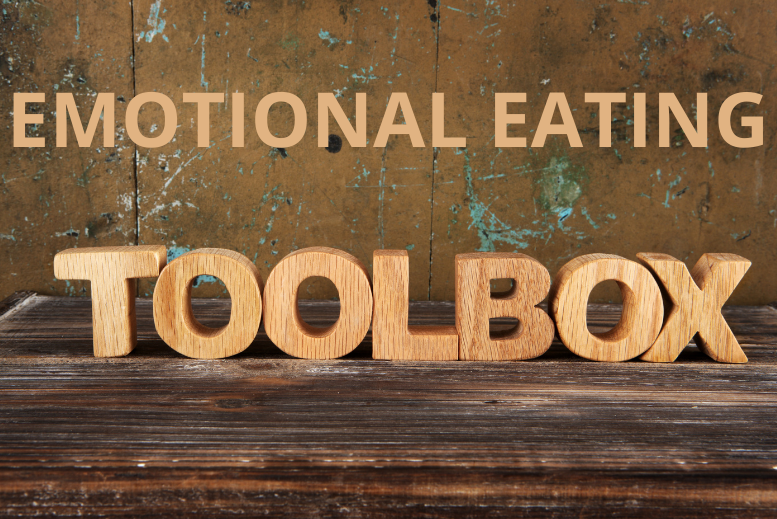By Kelly Jo Zellmann, MS, RDN, LD, CLT

Valentine’s day is fast approaching. A day dedicated to giving gifts, often chocolate or other sweets, to those you love. However, it may also bring up feelings of loneliness, anxiety, sadness, and hurt instead of love and connection. And, maybe you’ve been craving chocolate, carbs, salty or fried foods more than usual during the past year, leaving you feeling guilty and wondering why you just can’t stop? Well, there are several reasons behind why you may be experiencing increased cravings and emotional eating, but first, you need to understand why emotional eating isn’t a bad thing and why you can stop feeling guilty.
Food is Connection.
First of all, understand that you are human and we all experience food cravings along with feelings such as anxiety, boredom, loneliness, sadness, and hurt throughout our lives. Food oftentimes can become a source of comfort in the short term when experiencing these different emotions. But, ultimately, food won’t solve or fix the feelings or make them go away. Think about how strongly food connects us to one another and the ways food has comforted or brought you joy in the past. Maybe, it was your mom’s homemade brownies she would make only on your birthday and not only were they delicious, but they also made you feel special. Or, how about someone bringing you homemade chicken noodle soup when you’re sick. It really is chicken noodle soup for the soul!
Secondly, let’s talk about how we as humans have an innate need to connect with others and we need connection as much as physical nourishment (Salzberg, 2017). Connection to ourselves and to others is really a foundation that allows us to be able to enjoy food for pleasure without the guilt. It’s no surprise then, that people may be experiencing increased cravings for comfort and emotional eating during this year of social isolation. Our connections and ways we typically connect with others in the past have been thrown a curveball. Celebrations that usually center around food have been on hold or held via zoom, such as weddings and funerals. We are missing out on the togetherness of being able to break bread together or have cake. This may be leaving us with a void that we are using food to till those unmet needs of connection and feelings.
Thirdly, there is a physiological reason behind the power of increased cravings, which involves many parts of the brain. Stress itself triggers a specific brain neurotransmitter called CRF (corticotropin releasing factor) in the parts of the brain wired for cravings. Stress increases CRF, which can directly promote cravings itself. Then, when we do eat, it causes a release of the neurotransmitter dopamine, which is really stimulating. Therefore, it’s easy to understand that with all the added stressors and roller coaster of emotions of the pandemic, people’s stress may be at an all time high and food may be an easy source of comfort during these times.
So, have your chocolate and eat it too!
How we manage cravings and emotional eating is a common struggle many people have. The first step in understanding cravings and emotional eating is to identify it and bring awareness to it. Knowing what it is you want or are feeling and being able to determine if it is emotional hunger or physical hunger, will help to ensure you are going to be satisfied. Mindless eating will only lead to more consumption of food and less enjoyment and satisfaction.
The concepts of Intuitive and Mindful Eating encourage you to be gentler and more compassionate with yourself without guilt or judgment. To help get started, you can ask yourself these questions to reconnect with yourself and discover what your body needs now in order to cope with your feelings. (Tribole and Resch, 2020):
- Am I biologically hungry? If yes, eat! If no, continue with the following questions to find out what you are feeling and really want or need.
- What am I feeling? Write it out, call a friend, just sit with your feelings, and experience them if you can. If this is too difficult, you may need to talk to a counselor or therapist.
- What do I need? Try to identify what it is you need. Rest? Time for Self-Care?
- Do I need to ask for help? If needing time for yourself, you may need to ask for help. Asking your partner to help with the kids so you can do something for yourself or connect with a friend. Whatever it is you identify; you may need help to make it happen.
And, if you still are wanting to eat, then that is completely OK! Just because you are not biologically hungry, does not mean you shouldn’t eat. But, by pausing and identifying what you really need (physically and emotionally) and want, you are now honoring your body and the desire and can enjoy whatever it is mindfully and intuitively.
6 Tips for your Emotional Eating Toolbox

- Eat regular meals and snacks. Ensuring your body is getting a balanced mix of nutrients between carbohydrates, protein, and fat throughout the day will help minimize getting over-hungry, which can lead to cravings and overeating. Planning your meals and snacks along with having the foods available can help make it easier for you to get a mix of good nutrients with a focus on fruits, vegetables, whole grains, lean proteins, and healthy fats. Be sure to include one protein, fat, and carbohydrate every time you eat to help keep you energized.
- Drink more water. Sounds too easy and we have heard it forever, but water is the forgotten nutrient, and it is just as important as the other macronutrients. Not being adequately hydrated can leave you thinking you are hungry when you might actually be thirsty instead. How much water? The best indicator of hydration is the color of your urine. If it is a light, pale color like lemonade, you are likely well hydrated. Get in the habit of filling up a water bottle and refilling as needed throughout the day.
- Aim for 7-9 hours of sleep. Ever notice how you crave more foods when you are overly tired? Lack of sleep can really mess with our hunger hormones and increase cravings. If you are having trouble with falling asleep or staying asleep, this is important to work on and get help if needed! Try working on getting into a consistent bed-time routine that helps wind down your body and your brain.
- Give yourself unconditional permission to eat! Food restriction and deprivation naturally leads to a desire to want the food Once you start giving yourself permission to eat without guilt or judgment, food cravings can become less intense since you have normalized the food you are craving. This isn’t always easy and you may want to seek out additional support from a registered dietitian nutritionist.
- Get Moving. Our bodies were meant to move (not sit all day) and there are natural benefits of physical activity with the release of endorphins that help us feel good and improve our mood. This doesn’t mean having to work out for 2 hours every day or anything extreme. Exploring and finding ways that feel good to you and you enjoy are key to incorporating regular movement into your day and making it a part of your self- care routine.
- Take time for self-care. If you aren’t getting enough time for pleasure and relaxation, you may end up turning to food to cope. If we don’t take care of ourselves first and our internal needs, we may not have the tools to be able to cope with our feelings without turning to food. Find ways to nurture yourself in ways that help you reconnect with yourself and keep you balanced. Meditating, journaling, reading, deep breathing, and connecting with others are all ways that can help manage stress.
So, caving into your cravings isn’t all bad! Let go of the guilt and enjoy that chocolate or special dessert mindfully! We all have the right to enjoy food and eat for pleasure and your relationship with food will become more positive as you slowly let go of the fear of food as a coping mechanism and truly embrace it.
Curious for more information, check out the resources below and/or contact Kelly Jo Zellmann, MS, RDN, LD at kellyjo@nutritiousweighs.com.
Resources:
- S. Salzberg, (2017). Real Love: The Art of Mindful Connection. Flatiron Books.
- Tribole, E., and E. Resch. (2020). Intuitive Eating. A Revolutionary Anti-Diet Approach. (4th edition). St. Martin’s Publishing.

